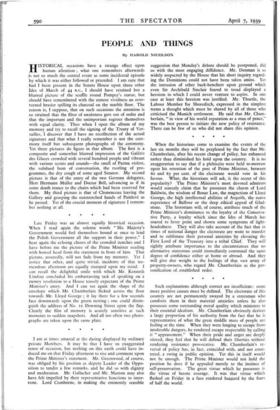PEOPLE AND THINGS
By HAROLD NICOLSON
HISTORICAL occasions have a strange effect upon human attention ; what one remembers afterwards is not so much the central event as some incidental episode by which it was either followed or preceded. I am sure that had I been present in the Senate House upon those other Ides of March of 44 B.c., I should have retained but a blurred picture of the scuffle round Pompey's statue, but should have remembered with the utmost vividness an over- turned brasier spilling its charcoal on the marble floor. The reason is, I suppose, that on such occasions the attention is so strained that the filter of awareness gets out of order and that the important and the unimportant register themselves with equal clarity. Thus when I open the album of my memory and try to recall the signing of the Treaty of Ver- sailles, I discover that I have no recollection of the actual signature and that what I really remember is not the cere- mony itself but subsequent photographs of the ceremony. Yet three pictures do figure in that album. The first is a composite and somewhat blurred impression of the Galerie des Glaces crowded with several hundred people and vibrant with various scents and sounds—the smell of Parma violets, the subdued hum of conversation, the rustling of pro- grammes, the dry cough of some aged Senator. My second picture is that of the entry of the two German delegates, Herr Hermann Muller and Doctor Bell, advancing as if in some death trance to the chairs which had been reserved for them. My third picture is that of Clemenceau leaving the Gallery and grasping the outstretched hands of Painleve as he passed. Yet of the crucial moment of signature I remem- ber nothing at all.










































 Previous page
Previous page